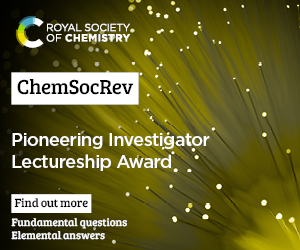You can find details about how to access information remotely in this step-by-step guide. The guide will also help if for any reason you have difficulty accessing the content you want.
What would you like to know about this journal?
Chem Soc Rev is a Transformative Journal, and Plan S compliant
Impact factor: 46.2*
Time to first decision (all decisions): 11.0 days**
Time to first decision (peer reviewed only): 24.0 days***
Chair: Jennifer Love
Indexed in MEDLINE and Science Citation Index
Open access publishing options available
Chem Soc Rev (Chemical Society Reviews) is the Royal Society of Chemistry's leading reviews journal. We publish high-impact, authoritative and reader-friendly review articles covering important topics at the forefront of the chemical sciences.
We welcome and encourage proposals for reviews from members of the research community. If you are interested in writing a review, you can download a proposal form via the links below. If you are interested in submitting a Viewpoint, please contact chemsocrev-rsc@rsc.org and we will be able to provide further guidance.
Journal scope
Chem Soc Rev publishes review articles covering important topics at the forefront of the chemical sciences. Reviews should be of the very highest quality and international impact. We particularly encourage international and multidisciplinary collaborations among our authors.
Our scope covers the breadth of the chemical sciences, including interdisciplinary topics where the article has a basis in chemistry. Topics include:
- Analytical chemistry
- Biomaterials chemistry
- Bioorganic/medicinal chemistry
- Catalysis
- Chemical Biology
- Coordination Chemistry
- Crystal Engineering
- Energy
- Sustainable chemistry
- Green chemistry
- Inorganic chemistry
- Inorganic materials
- Main group chemistry
- Nanoscience
- Organic chemistry
- Organic materials
- Organometallics
- Physical chemistry
- Supramolecular chemistry
- Synthetic methodology
- Theoretical and computational chemistry
ChemSocRev Pioneering Investigator Lectureship
This award recognises mid-career scientists who have firmly established themselves in their independent careers and continuously publish innovative and pioneering work.
Nominations are now closed. We expect to open nominations for the 2024 lectureship in the Autumn
Read about eligibility, how to nominate, and see all award winners
Meet the team
Find out who is on the editorial and advisory boards for the Chem Soc Rev journal.
Chair
Jennifer Love, University of Calgary, Canada
Associate editors
Louise Berben, University of California Davis, USA
Vy Dong, University of California, Irvine
Rebecca Goss, University of St Andrews, UK
Zhong-Qun Tian, Xiamen University, China
Xian-He Bu, Nankai University, China
Editorial board members
Giulia Grancini, University of Pavia, Italy
Osamu Ishitani, Tokyo Institute of Technology, Japan
Tatjana Parac-Vogt, KU Leuven, Belgium
Raghavan B. Sunoj, Indian Institute of Technology Bombay, India
Ryu Abe, Kyoto University
Dave Adams, University of Glasgow
David Amabilino, Institute of Materials Science of Barcelona
Ruchi Anand, IIT Bombay
Ivan Aprahamian, Dartmouth College
Parisa A. Ariya, McGill University
Tom Baker, University of Ottawa
Thomas Bennett, University of Cambridge
Gonçalo Bernardes, University of Cambridge
Barry Blight, University of New Brunswick
Anne-Marie Caminade, University of Toulouse
Araceli Campaña, University of Granada
Rui Cao, Shaanxi Normal University
Hong Chen, Soochow University
Yong Cui, Shanghai Jiao Tong University
Abhishek Dey, IACS
Huw Davies, Emory University
Wim Dehaen, Catholic University of Leuven
William Dichtel, Northwestern University
Yves Dufrêne, Université catholique de Louvain
Antonio Echavarren, Institute of Chemical Research of Catalonia
Elena Fernández, Universitat Rovira i Virgili
Miriam Freedman, Pennsylvania State University, USA
Philip A Gale, The University of Sydney, Australia
Debashree Ghosh, IACS
Duncan Graham, University of Strathclyde
Stefan Grimme, Universität Bonn
Frances Houle, Lawrence Berkeley National Laboratory
Ashlee Howarth, Concordia University
Feihe Huang, Zhejiang University
Masako Kato, Kwansei Gakuin University
Jong Seung Kim, Korea University
Rafal Klajn, Weizmann Institute of Science
Daniele Leonori, RWTH Aachen University
Chao-Jun Li, McGill University
Jinghong Li, Tsinghua University
Yan Li, Peking University
Zhuang Liu, Soochow University
Norberto Peporine Lopes, CEMMO
Bettina Lotsch, Max Planck Institute for Solid State Research
Connie Lu, University of Minnesota
Cara Lubner, NREL
Rafael Luque, King Saud University
Uday Maitra, Indian Institute of Science
Nazario Martín, Complutense University of Madrid
Feliu Maseras, Institute of Chemical Research of Catalonia
Fiona Meldrum, University of Leeds
Gugu Mhlongo, CSIR
Simona Mura, Institut Galien Paris-Saclay
Brenno Neto, University of Brasilia
Tebello Nyokong, Rhodes University
Martin Oestreich, Technische Universität Berlin
Elisa Orth, Federal University of Paraná
Mario Pagliaro, National Research Council (NRC)
Atul Parikh, University of California Davis
Kanyi Pu, Nanyang Technological University
Eric Rivard, University of Alberta
Gregory Robinson, University of Georgia
Peter Roesky, Karlsruhe Institute of Technology
Ashley Ross, University of Cincinnati
Vincent Rotello, University of Massachusetts
Joanna Sadler, University of Edinburgh
Paolo Samori, University of Strasbourg
D.D. Sarma, Indian Institute of Science
Clément Sanchez, Pierre and Marie Curie University
Hélder A. Santos, University of Helsinki
Jennifer Schaefer, Notre Dame
Wendy Shaw, PNNL
Injae Shin, Yonsei University
David Spring, University of Cambridge
Andrew Steckl, University of Cincinnati
Samuel Stupp, Northwestern University
Jin Suntivich, Cornell University
Kana Sureshan, IISER Thiruvananthapuram
Micheal Tam, University of Waterloo
Andrea Trabocchi, University of Florence
James Tucker, University of Birmingham
Leyong Wang, Nanjing University
Peng Wang, Changchun Institute of Applied Chemistry
Bert Weckhuysen, Utrecht University
Helma Wennemers, ETH Zurich
Stephen Withers, University of British Columbia
Yujie Xiong, University of Science and Technology of China
Makoto Yamashita, Nagoya University
Juyoung Yoon, Ewha Womans University
Shuli You, Shanghai Institute of Organic Chemistry, Chinese Academy of Sciences
Guihua Yu, University of Texas at Austin
Claudio Zannoni, University of Bologna
Haoli Zhang, Lanzhou University
Qiang Zhang, Tsinghua University
Yong Zhang, City University of Hong Kong
Yiping Zhao, University of Georgia
Hongli Zhu, Northeastern University
Richard Kelly, Executive Editor, 0000-0003-2380-9315
Jon Ferrier, Deputy Editor
Danny Andrews, Development Editor
Ershad Abubacker, Development Editor
Jade Holliday, Editorial Assistant
Helen Saxton, Editorial Production Manager 0000-0002-1560-7396
Becky Webb, Senior Publishing Editor
Kirstine Anderson, Publishing Editor
Matthew Bown, Publishing Editor
Laura Cooper, Publishing Editor
Hannah Fielding, Publishing Editor
Anoushka Handa, Publishing Editor
Claire Harding, Publishing Editor
Alan Holder, Publishing Editor, ORCID 0000-0001-5228-877X
Charlie Palmer, Publishing Editor
Rosie Rothwell, Publishing Editor
Donna Smith, Publishing Editor, ORCID 0000-0002-1337-2327
Laura Smith, Publishing Editor, ORCID 0000-0002-2976-8529
Natalie Ford, Publishing Assistant
Jeanne Andres, Publisher
Journal guidelines
For accepted proposals or invited submissions, authors are encouraged to submit their full manuscript on the Royal Society of Chemistry article template, which is available to download here.
Open access publishing options
Chem Soc Rev is a hybrid (transformative) journal and gives authors the choice of publishing their research either via the traditional subscription-based model or instead by choosing our gold open access option. Find out more about our Transformative Journals. which are Plan S compliant.
Gold open access
For authors who want to publish their article gold open access, Chem Soc Rev charges an article processing charge (APC) of £2,750 (+ any applicable tax). Our APC is all-inclusive and makes your article freely available online immediately, permanently, and includes your choice of Creative Commons licence (CC BY or CC BY-NC) at no extra cost. It is not a submission charge, so you only pay if your article is accepted for publication.
Learn more about publishing open access.
Read & Publish
If your institution has a Read & Publish agreement in place with the Royal Society of Chemistry, APCs for gold open access publishing in Chem Soc Rev may already be covered.
Use our journal finder to check if your institution has an open access agreement with us.
Please use your official institutional email address to submit your manuscript and check you are assigned as the corresponding author; this helps us to identify if you are eligible for Read & Publish or other APC discounts.
Traditional subscription model
Authors can also publish in Chem Soc Rev via the traditional subscription model without needing to pay an APC. Articles published via this route are available to institutions and individuals who subscribe to the journal. Our standard licence allows you to make the accepted manuscript of your article freely available after a 12-month embargo period. This is known as the green route to open access.
Readership information
Chem Soc Rev has a truly international readership, from emerging investigators to eminent scientists working in across all areas of the chemical sciences.
Subscription information
Chemical Society Reviews is part of collections RSC Gold and General Chemistry.
Online only 2024: ISSN 1460-4744, £1,359 / $2,156
*2022 Journal Citation Reports (Clarivate Analytics, 2023)
**The median time from submission to first decision including manuscripts rejected without peer review from the previous calendar year
***The median time from submission to first decision for peer-reviewed manuscripts from the previous calendar year
Contact us
- Email:
- Richard Kelly
- Email:
- Helen Saxton
Share
Advertisement


